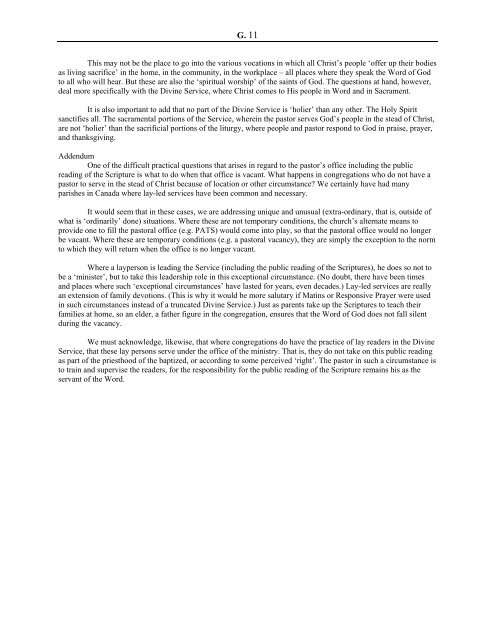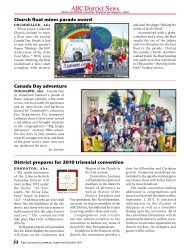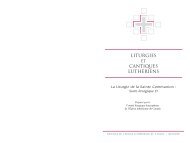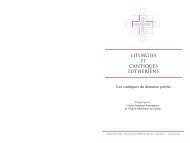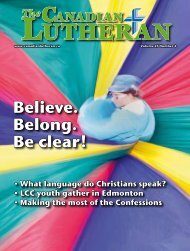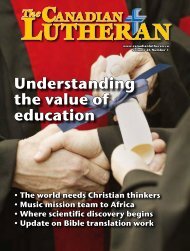Planned Giving Gift Summary - Lutheran Church-Canada
Planned Giving Gift Summary - Lutheran Church-Canada
Planned Giving Gift Summary - Lutheran Church-Canada
Create successful ePaper yourself
Turn your PDF publications into a flip-book with our unique Google optimized e-Paper software.
G. 11<br />
This may not be the place to go into the various vocations in which all Christ’s people ‘offer up their bodies<br />
as living sacrifice’ in the home, in the community, in the workplace – all places where they speak the Word of God<br />
to all who will hear. But these are also the ‘spiritual worship’ of the saints of God. The questions at hand, however,<br />
deal more specifically with the Divine Service, where Christ comes to His people in Word and in Sacrament.<br />
It is also important to add that no part of the Divine Service is ‘holier’ than any other. The Holy Spirit<br />
sanctifies all. The sacramental portions of the Service, wherein the pastor serves God’s people in the stead of Christ,<br />
are not ‘holier’ than the sacrificial portions of the liturgy, where people and pastor respond to God in praise, prayer,<br />
and thanksgiving.<br />
Addendum<br />
One of the difficult practical questions that arises in regard to the pastor’s office including the public<br />
reading of the Scripture is what to do when that office is vacant. What happens in congregations who do not have a<br />
pastor to serve in the stead of Christ because of location or other circumstance? We certainly have had many<br />
parishes in <strong>Canada</strong> where lay-led services have been common and necessary.<br />
It would seem that in these cases, we are addressing unique and unusual (extra-ordinary, that is, outside of<br />
what is ‘ordinarily’ done) situations. Where these are not temporary conditions, the church’s alternate means to<br />
provide one to fill the pastoral office (e.g. PATS) would come into play, so that the pastoral office would no longer<br />
be vacant. Where these are temporary conditions (e.g. a pastoral vacancy), they are simply the exception to the norm<br />
to which they will return when the office is no longer vacant.<br />
Where a layperson is leading the Service (including the public reading of the Scriptures), he does so not to<br />
be a ‘minister’, but to take this leadership role in this exceptional circumstance. (No doubt, there have been times<br />
and places where such ‘exceptional circumstances’ have lasted for years, even decades.) Lay-led services are really<br />
an extension of family devotions. (This is why it would be more salutary if Matins or Responsive Prayer were used<br />
in such circumstances instead of a truncated Divine Service.) Just as parents take up the Scriptures to teach their<br />
families at home, so an elder, a father figure in the congregation, ensures that the Word of God does not fall silent<br />
during the vacancy.<br />
We must acknowledge, likewise, that where congregations do have the practice of lay readers in the Divine<br />
Service, that these lay persons serve under the office of the ministry. That is, they do not take on this public reading<br />
as part of the priesthood of the baptized, or according to some perceived ‘right’. The pastor in such a circumstance is<br />
to train and supervise the readers, for the responsibility for the public reading of the Scripture remains his as the<br />
servant of the Word.


